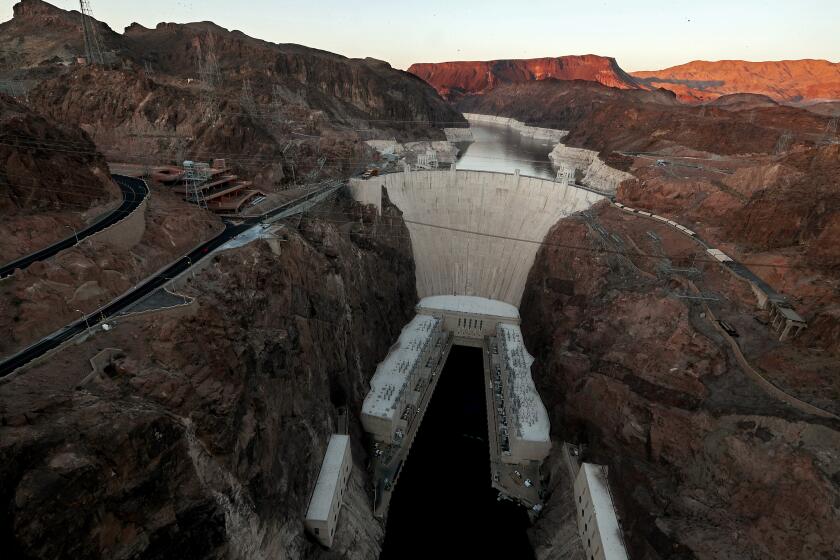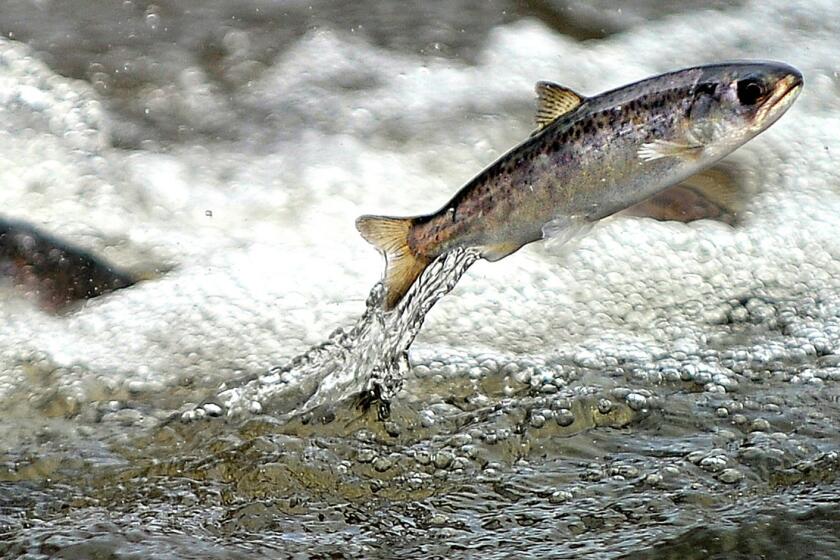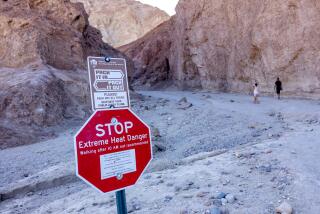Scientists warn of ‘massive mortality’ of marine life as Mediterranean Sea heats up

- Share via
MADRID — While vacationers might enjoy the Mediterranean Sea’s summer warmth, climate scientists are warning of dire consequences for its marine life as it burns up in a series of severe heat waves.
From Barcelona to Tel Aviv, scientists say they are witnessing exceptional water temperature hikes ranging from 5.4 to 9 degrees above the norm for this time of year.
Water temperatures have regularly exceeded 86 degrees on some days.
Extreme heat in Europe and other countries around the Mediterranean has grabbed headlines this summer, but the rising sea temperature is largely out of sight and out of mind.
Marine heat waves are caused by ocean currents building up areas of warm water.
Weather systems and heat in the atmosphere can also add degrees to the water temperature.
And just like their on-land counterparts, marine heat waves are longer, more frequent and more intense because of human-induced climate change.
The situation is “very worrying,” says Joaquim Garrabou, a researcher at the Institute of Marine Sciences in Barcelona. “We are pushing the system too far. We have to take action on the climate issues as soon as possible.”
Garrabou is part of a team that recently published a report on heat waves in the Mediterranean Sea between 2015 and 2019. The report says these phenomena have led to “massive mortality” of marine species.
Records are tumbling as temperatures are rising across Europe, where a monster heat wave is fueling wildfires and causing deaths. The mark in London hits about 104 Fahrenheit.
About 50 species, including corals, sponges and seaweed, were affected along thousands of miles of Mediterranean coastline, according to the study, which was published in the Global Change Biology journal.
The situation in the eastern Mediterranean basin is particularly dire.
The waters off Israel, Cyprus, Lebanon and Syria are “the hottest hot spot in the Mediterranean for sure,” said Gil Rilov, a marine biologist at Israel’s Oceanographic and Limnological Research institute, and one of the paper’s co-authors. Average sea temperatures in the summer are now consistently higher than 88 degrees.
These warming seas are driving many native species to the brink, “because every summer their optimum temperature is being exceeded,” he said.
France is in the midst of its fourth heat wave of the year as the country faces what the government warned is its worst drought on record
What he and his colleagues are witnessing in terms of biodiversity loss is what is projected to happen farther west in the Mediterranean toward Greece, Italy and Spain in the coming years.
Garrabou points out that seas have been serving the planet by absorbing 90% of the Earth’s excess heat and 30% of carbon dioxide emitted into the atmosphere by coal, oil and gas production. This carbon-sink effect shields the planet from even harsher climate effects.
This was possible because oceans and seas were in a healthy condition, Garrabou said.
“But now we have driven the ocean to an unhealthy and dysfunctional state,” he said.
The federal government has announced a tier 2 emergency based on Lake Mead water levels, requiring reductions for Arizona, Nevada and Mexico.
While the Earth’s greenhouse gas emissions will have to be drastically reduced if sea warming is to be curtailed, ocean scientists are specifically looking for authorities to guarantee that 30% of sea areas are protected from human activities such as fishing, which would give species a chance to recover and thrive.
About 8% of the Mediterranean Sea area is currently protected.
Garrabou and Rilov said that policymakers are largely unaware of the warming Mediterranean and its impact.
“It’s our job as scientists to bring this to their attention so they can think about it,” Rilov said.
Our oceans. Our public lands. Our future.
Get Boiling Point, our new newsletter exploring climate change and the environment, and become part of the conversation — and the solution.
You may occasionally receive promotional content from the Los Angeles Times.
Land heat waves help cause marine heat waves. The two tend to feed each other in a vicious, warming circle.
Land heat waves have become commonplace in many countries around the Mediterranean, with dramatic side effects such as wildfires, droughts, crop losses and excruciatingly high temperatures.
But marine heat waves could also have serious consequences for the countries bordering the Mediterranean and the more than 500 million people who live there if it’s not dealt with soon, scientists say. Fish stocks will be depleted and tourism will be adversely affected, as destructive storms could become more common on land.
Despite representing less than 1% of the global ocean surface area, the Mediterranean is one of the main reservoirs of marine biodiversity, containing between 4% and 18% of the world’s known marine species.
The fish, which died of chlorine exposure, included green and white sturgeon and chinook salmon that were being studied at the facility.
Some of the most affected species are key to maintaining the functioning and diversity of the sea’s habitats. Species like the Posidonia oceanica seagrass meadows, which can absorb vast amounts of carbon dioxide and shelter marine life, or coral reefs, which are also home to wildlife, would be at risk.
Garrabou says the mortality impacts on species were observed between the surface and around 150 feet deep, where the recorded marine heat waves were exceptional. Heat waves affected more than 90% of the Mediterranean Sea’s surface.
According to the most recent scientific papers, the sea surface temperature in the Mediterranean has increased by 0.72 of a degree each decade between 1982 and 2018.
On a yearly basis, it has been rising by about 0.09 of a degree over the last decade without any sign of letting up.
Even fractions of degrees can have disastrous effects on ocean health, experts say.
The affected areas have also grown since the 1980s and now cover most of the Mediterranean, the study suggests.
“The question is not about the survival of nature, because biodiversity will find [a] way to a survive on the planet,” Garrabou said.
“The question is if we keep going in this direction, maybe our society, humans, will not have a place to live.”
More to Read
Sign up for Essential California
The most important California stories and recommendations in your inbox every morning.
You may occasionally receive promotional content from the Los Angeles Times.














